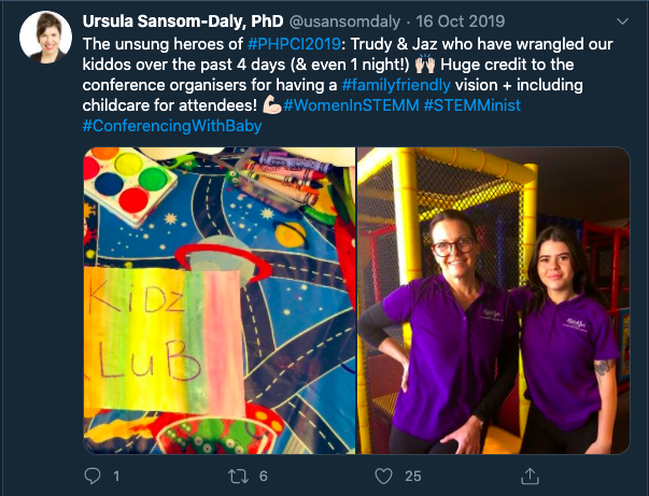Could the COVID-19 lockdown solve one of the persistent barriers to gender equity in research?
Dr Ursula Sansom-Daly and Caroline Ford

Conference Travel
While attending and presenting at conferences is a core aspect of contributing to research, the travel aspect of this, that is almost always non-negotiable, makes conference attendance almost impossible for many early career researchers with young children, or those with elderly or unwell family members.
Conferences are vital for development of research ideas, presenting outcomes from research and have important networking opportunities for early career researchers to connect with international researchers for collaborations.
Despite changing societal expectations around the distribution of caring and domestic duties in the home, women still disproportionally carry the load of this work, making conference attendance even harder.
Are there any equitable solutions for this?
The obvious solution is for researchers with children to just bring their children along, but this isn’t always possible and presents a whole new area of problems to be dealt with. For example: what do the kids do while you’re trying to present a keynote speech? How do you network effectively with children interrupting? There are sometimes opportunities for researchers to access scholarships to help fund the extra costs associated with bringing family along, and very occasionally some innovative conferences have offered childcare as part of the registration fee (see pic). However, these types of support tend to be the exception rather than the rule, available to only a few lucky researchers.
Who is missing out on this?
It’s not uncommon for the costs of attending an international conference to exceed AU$3000. This sort of money is often not manageable for early career researchers who do not have travel budgets, or researchers who live in low-to-middle income countries. And while there is undoubtedly a career impact from not attending conferences while your colleagues are, it is really challenging to quantify this. Ursula describes this as similar to the phenomenon of Friday-night drinks in the corporate world: how do we know exactly what chance meeting we may or may not have missed out on by not crossing paths with a particular professor at a conference and having the opportunity to discuss potential collaborations?
“The sky does, in fact, not fall in when we stream a conference session over Zoom”
We have had good videoconferencing abilities for over a decade, but it has taken a global pandemic and closed borders to move conferences online. Conferences held recently, like the 2020 Victorian Cancer Survivorship Conference and the American Association for Cancer Research Annual Meeting 2020, successfully welcomed virtual attendees from across the world just as the COVID-19 lockdown was becoming very real in Australia.
Can the COVID-19 pandemic be the catalyst for change and a move towards gender equity?
Is it possible that the unexpected silver lining to this pandemic is that we are able to close the gap for women in STEMM? While we are all looking forward to face-to-face conversations and gatherings again, we are hopeful that the lessons we have all learned from working and networking remotely will lay the foundations for greater diversity in academia into the future.
To read the full article written by Dr Ursula Sansom-Daly and Associate Prof Caroline Ford, visit this link https://oncologynews.com.au/could-the-covid-19-lockdown-solve-one-of-the-persistent-barriers-to-gender-equity-in-research/
 RSS Feed
RSS Feed